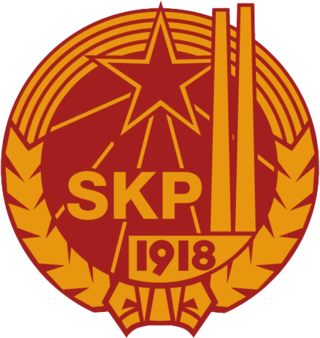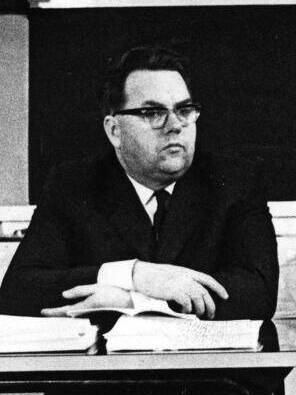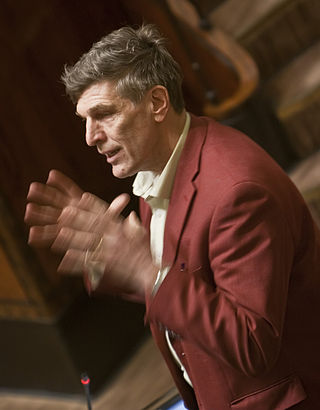
The Communist Party of Finland was a communist political party in Finland. The SKP was a section of Comintern and illegal in Finland until 1944.
Kommunistiska Förbundet Marxist-Leninisterna was formed at the 1967 party congress of VPK, when a pro-Chinese group left the party.

Democratic Alternative was a political party in Finland. Deva was formed in 1986 by expelled members of the Communist Party of Finland and its mass front Finnish People's Democratic League. In 1990 Deva disintegrated and its members joined the Left Alliance, a merger of SKP and SKDL, founded earlier that year.
Socialist Workers' Party was a political party in Finland. The STP was founded in 1973 as split from Social Democratic Union of Workers and Smallholders (TPSL). STP emerged from a group that did not approve of the return of TPSL to the Social Democratic Party.

Finnish People's Democratic League was a Finnish political organisation with the aim of uniting those left of the Finnish Social Democratic Party. It was founded in 1944 as the anti-communist laws in Finland were repealed due to the demands of the Soviet Union, and lasted until 1990, when it merged into the newly formed Left Alliance. At its time, SKDL was one of the largest leftist parties in capitalist Europe, with its main member party, the Communist Party of Finland, being one of the largest communist parties west of the Iron Curtain. The SKDL enjoyed its greatest electoral success in the 1958 parliamentary election, when it gained a support of approximately 23 per cent and a representation of 50 MPs of 200 total, making it the largest party in the Eduskunta.

Communist Workers' Party – For Peace and Socialism is a communist party in Finland. It was founded in 1988 to secure the existence of an independent Marxist–Leninist party. Since it was founded, it has been re-registered and subsequently de-registered multiple times. Since its founding, it has failed to gain any seats in the Parliament of Finland. The party has been de-registered since 2019.
The League of Communists or Communist League is a Finnish Marxist-Leninist political organization. The League of Communists was founded on 14.9.2002 by the Communists who were expelled from the For Peace and Socialism - Communist Workers Party (KTP). The organization was at first known as, plainly, Communists (Kommunistit) but the name was changed to its current form during the registration process.

Karl Harald Wiik was a Swedish-speaking Finnish Social Democratic (SDP) leader. Elected to parliament numerous times between 1911 and the time of his death and Secretary of the SDP for more than a decade, Wiik is remembered as one of six radical SDP members of parliament expelled from the SDP in the aftermath of the Winter War with the Soviet Union.
Socialist Unity Party was a left-wing political party in Finland. The SYP was founded in March 1946 by socialists working inside the communist-dominated Finnish People's Democratic League (SKDL). Most of the founders were former members of the Social Democratic Party of Finland (SDP). The SYP had many known politicians in its ranks but it never became a mass party. In 1955, the party split from the SKDL and was disestablished soon afterwards.
Taistoism was an orthodox pro-Soviet tendency in the mostly Eurocommunist Finnish communist movement in the 1970s and 1980s. The Taistoists were an interior opposition group in the Communist Party of Finland. They were named after their leader Taisto Sinisalo, whose first name means "a battle", "a fight" or "a struggle". Sinisalo's supporters constituted a party within a party, but pressure from the Communist Party of the Soviet Union prevented the party from formally splitting. The term taistolaisuus was a derogatory nickname invented by Helsingin Sanomat and was never used by the group themselves. In colloquial Finnish, taistolainen is the same as Tankie in English.

Taisto Jalo Sinisalo was a Finnish communist politician, MP of the SKDL (1962–1978), leader of the Communist Party of Finland’s hardline pro-Soviet faction and vice chairman of the party (1970–1982). After the SKP split in the 1980s, Sinisalo became the first chairman of the Communist Party of Finland (Unity) (SKPy).

Esko-Juhani Tennilä was a Finnish leftist politician from Lapland and member of Parliament since 1975 until 2011.
Tiedonantaja is a Finnish leftist monthly newspaper published in Helsinki, Finland. It is the party organ of the new Communist Party of Finland (SKP).

Ville Pessi was a Finnish communist politician. Pessi hailed from a proletarian family. He became involved in leftist politics in 1919. He joined the Communist Party of Finland (SKP) in 1924, when it was still illegal. Pessi served as secretary of the Socialist Youth League 1925-1927. He was twice sent by the party to the Soviet Union for studies. Soon after he came back to Finland he was arrested and spent the years from 1935 to 1944 in prison. He was freed as a consequence of the Moscow Armistice of 19 September 1944, when the SKP was legalised. He was elected as the general secretary of the SKP in 1944 and served in the post until 1969 when he was replaced by Arvo Aalto. He was a member of the Parliament of Finland from 1945 to 1966, representing the Finnish People's Democratic League (SKDL).

Markus Kainulainen was a Finnish communist politician. He was a member of the Central Committee of the Communist Party of Finland (SKP) and served as a Member of the Parliament of Finland from 1975 to 1979 and again from 1982 to 1983, representing the Finnish People's Democratic League (SKDL). After the SKP split in the 1980s, Kainulainen at first joined the Communist Party of Finland (Unity) (SKPy). The SKPy split in 1988 as well and Kainulainen was one of the leading organisers of a new party, Communist Workers' Party – For Peace and Socialism (KTP).
The six-hour day is a schedule by which the employees or other members of an institution spend six hours contributing. This is in contrast to the widespread eight-hour day, or any other time arrangement. It has also been proposed as a better alternative to the four-day week, another proposed way to reduce working time.

Arvo Aalto is a Finnish politician who headed the Communist Party between 1984 and 1988. He also served as the labour minister from 1977 to 1981.
Socialism in Finland is thought to stretch back to the latter half of the 19th century in the Grand Duchy of Finland, with the radicalization of the labour movement and increasing industrialization of Finland.












